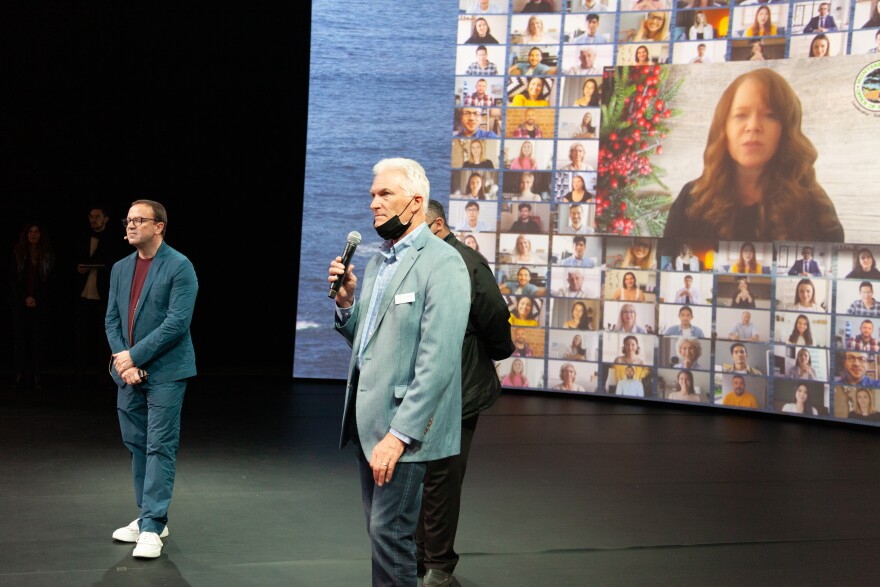The Monterey Conference Center is still struggling to get back to where it was before the pandemic. As variant after variant sweeps across the world, the City of Monterey is trying to figure out the role of a 40,000 square-foot conference center in an increasingly virtual world.
The building sits next to the Portola Hotel and Spa at the foot of Alvarado Street. The view from its Stevenson Terrace takes in a panorama of what makes Monterey an exciting tourism destination. To the right is the city’s downtown with its outdoor dining, bars and nightlife. To the left is the dark blue Pacific Ocean.
Doug Phillips is general manager of the city-owned facility, which opened in 1976.
In 2015, it began a three year, $60 million renovation. It was money well invested because when it reopened, business was so good Phillips says he actually had to turn away meetings.
“The conference center was finally turning a profit,” Phillips said. “For the first time in its history we were actually making money.”
Then COVID hit and the wheels came off.
“You can't imagine, to go from that kind of high that we were at, to the low,” he said.
With lockdowns, the conferences stopped and the layoffs began. All 14 full-time employees were sent home. Part-time and seasonal employees weren’t hired and Phillips was alone in an empty building.
“I felt like Jack Nicholson in ‘The Shining’. I was the only one here,” Phillips said.
Since then business has improved. About half of the staff has been rehired. Some conferences have been held, but business is nowhere near where it was before the pandemic, and no one knows when or if it ever will be.
Thomas Soetens is co-founder and CEO of a company called Immersive Design Studios.The Canadian-based company developed a technology called Canvas Studio that helps create virtual online conferences.
In one of the conference center’s meeting rooms, two large screens form semi circles around a speaker making a presentation.. Each of the screens shows the faces of hundreds of virtual attendees in small boxes, like a super-sized version of Hollywood Squares.

“What we create is an experience for the speaker. The speaker is surrounded by 1,100 people in the front row. He can bring up any of his content. He's immersed in a 360 degree screen,” Soetens said.
There are breakout rooms for discussion and virtual product display rooms for vendors.
And the screens don’t just show the attendees. They can also show a video, a powerpoint presentation or a guest presenter from anywhere in the world. The screen can also zoom in on an attendee who has a question for the speaker.
Mary Jo Zenk is the program director for the Institute for Innovation and Economic Development at CSU Monterey Bay, which creates programs that feature business start-ups and new technologies. She watched a Canvas Studio demonstration and was impressed with the technology’s ability to engage the audience.
“It provided a much faster way to bring people onto the stage,” she said. “You have a screen of all these different heads and that's pretty impressive.”
She added the presentation feels more like a television program than a Zoom session.
“It is like you need a director and somebody who can switch the cameras and stuff. So it is definitely much more of a production,” she said.
Zenk doesn’t believe in-person conferences are going away. She says whether a conference is virtual or in-person will be determined by its purpose.
Virtual conferences can include speakers from around the world without demanding they travel, for example. They’re also great for presenting educational material or reports.
But Zenk said that they lack the personal connection of networking face-to-face.
“You can get so much done over a cup of coffee at a conference and really make some good connections,” she said.
Meetings that involve networking will likely be in-person or hybrid, and that’s good news for the hotels that support the conference center. They have also struggled through the pandemic.
“I think there will be an appetite for being in-person again because people miss traveling,” Zenk said.
Back at the conference center, Doug Phillips sits in an empty room and contemplates the future of his business. Virtual conferences are still more of a concept than a reality.
“We've just scratched the surface of what we can do with this and how we can apply it,” Phillips said. “And it's just fun because the more you play with it, the more you realize how versatile it really is.”
And the new tools being developed for virtual conferences make turning that concept into a reality a lot more exciting.



